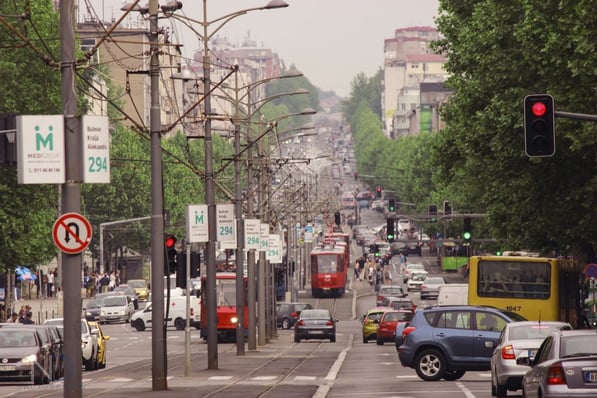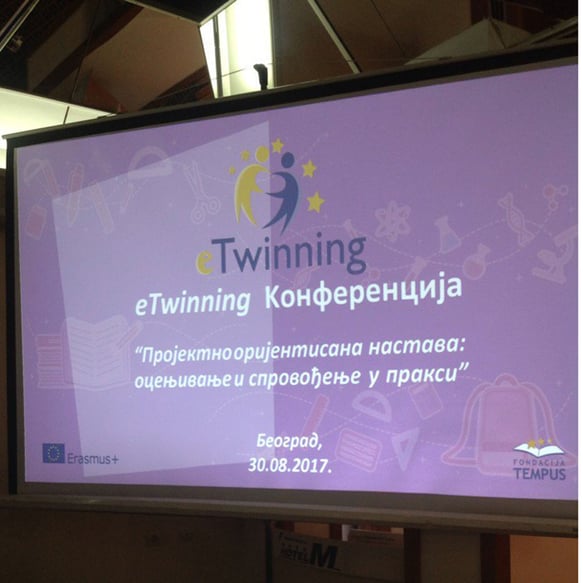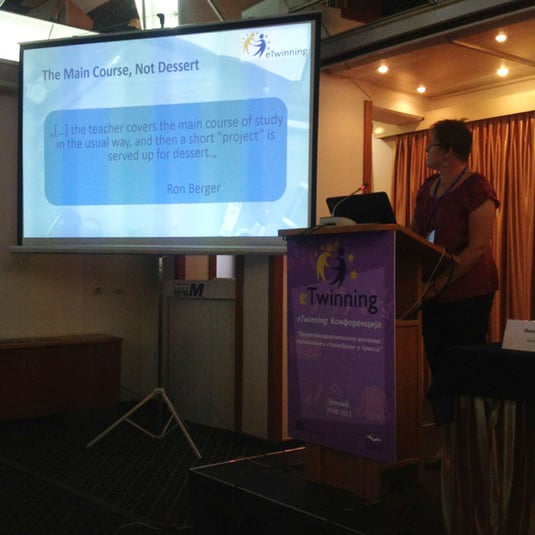An Irishman goes eTwinning in Serbia
 Corkman Ronan O’Sullivan is a Maths teacher in Davis College Mallow. He has twenty years’ teaching experience and has worked with children of many social, cultural and religious backgrounds. As an eTwinning Ambassador, he helps to give Irish schools an insight into the teaching and learning practices of schools in other participating countries, and supports teachers in bringing new ideas to the classroom. eTwinning connects schools across Europe and offers professional learning opportunities for teachers, including thematic conferences. Ronan recently travelled to Serbia to give eTwinners an Irish perspective on Project Based Learning.
Corkman Ronan O’Sullivan is a Maths teacher in Davis College Mallow. He has twenty years’ teaching experience and has worked with children of many social, cultural and religious backgrounds. As an eTwinning Ambassador, he helps to give Irish schools an insight into the teaching and learning practices of schools in other participating countries, and supports teachers in bringing new ideas to the classroom. eTwinning connects schools across Europe and offers professional learning opportunities for teachers, including thematic conferences. Ronan recently travelled to Serbia to give eTwinners an Irish perspective on Project Based Learning.
Belgrade Calling!
In the summer of 2017 the Serbian eTwinning National Support Service (NSS), Tempus Foundation, put out a call for someone to speak on Project Based Learning at their eTwinning conference. I answered that call and was delighted to be chosen to speak. The topic was "Project Based Learning: Evaluation and Implementation in Practice". Over the next month I settled down to work on a presentation giving “An Irish Perspective” on the subject.
The eTwinning national conference took place on 30 August 2017 in Serbia’s capital Belgrade. After travelling from Dublin through Munich and on to Belgrade, my first encounter with Serbia was a driver who was there to bring me to my accommodation. Immediately I realised that he was full of knowledge and information. I couldn’t have asked for a better tour guide! He was illuminating, and I learned a lot on our journey. Interestingly his knowledge of Irish history was amazing: he was able to name historical figures and their effect on modern day Ireland. This was truly one of the most interesting taxi journeys I have had in my lifetime.
Serbia made an immediate impact. Belgrade is a typical large busy city, but something made it strangely inviting. Maybe my childhood watching and hearing about Red Star Belgrade Football team has clouded my views. Also 34 degrees of heat helps when you come from the inclement weather of Ireland. The people and the noise make Belgrade what it is. The people are welcoming and friendly, although well able to give their opinions and thoughts on a wide array of topics. They are assertive and innovative. I suppose this should not be surprising, with people like Nikola Tesla in their heritage.
The eTwinning view on Project Based Learning
The first night we had a two-hour meeting to discuss the agenda for the following day. It was hosted by Ivana, Marica and Nataša from Tempus Foundation. I got a chance to meet the other speakers, as well as some of Serbia’s eTwinning Ambassadors. We discussed the merits of Project Based Learning (PBL) and planned the workshops that would happen the following afternoon. A nice aspect of the meeting was hearing the discussion about the eTwinning National Quality Labels, and the schools that would receive them at the conference.
The next day was conference day - I think the Serbian NSS were up very early to organise their agenda! The venue was ready for close to 250 participants. Audio visual technology was all in place, including a booth for translation from Serbian to English and vice versa. All any attendee had to do was put on a headset and they had a direct translation of the language in use. Snežana Markovic from the Ministry of Education, Science and Technological Development gave an introductory speech and spoke with authority on many topics. She highlighted the need for new teaching methods for a new age in education, the merits of PBL, and the need to open up education beyond the classroom with digital tools. To my mind, she understood very clearly the changes in education and the need to embrace and control the digital revolution in our classrooms. She praised the Tempus Foundation and the teachers for all their great work.
Following her, Ivan Anic from the Faculty of Sciences at the University of Novi Sad spoke on the advantages and challenges of Project Based Learning. Ivan does all his teaching through PBL, and delivered a great speech on the changing face of education. Some students now have tens of thousands of followers online, and he detailed one who at the tender age of fifteen was working with millions through their online presence! He also admitted that PBL is not easy and takes time, but that the final result is well worth the effort.
The Irish perspective on Project Based Learning
Nerves over, there was nothing more that could be done but rise behind the podium. I had spent quite a long while preparing my presentation. I also knew my subject material very well. I wanted to impart an Irish perspective on Project Based Learning. With the advent of Project Maths in 2010, Irish Maths teachers are in a good position to debate the merits of PBL. I decided to focus on these ideas:
- Definition of PBL
- Aims of PBL
- Advantages of PBL
- The Irish Perspective (Project Maths, Junior Cycle Reform)
- Sample lesson plans for a subject (Improving the effectiveness of PBL)
- Cross Curricular Approach
- Common problems
- Assessment (AFL and Rubric for Assessment)
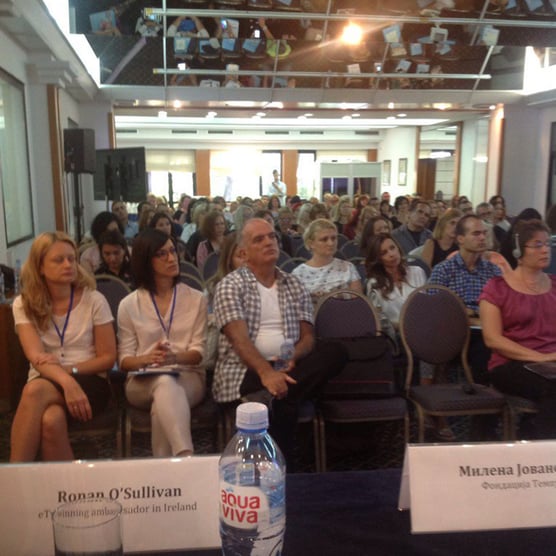
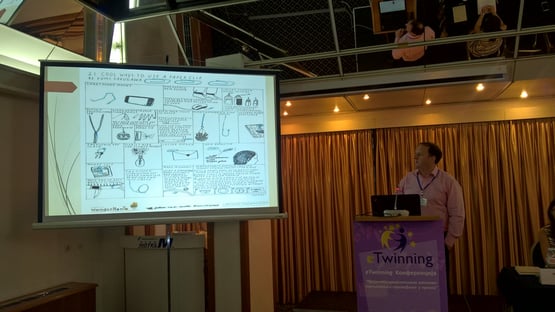
I hope that I showed why I value Project Based Learning so much. In the past, education was based on the leading model of employment. Subjects and methods were based on repetitive tasks which were valued in areas like the manufacturing industry. A lot of workers were trained in certain procedures. They dutifully carried out these tasks from day to week to year, maybe for the rest of their working lives. The idea of Lifelong Learning--so strong under current EU funding--was neither encouraged nor promoted.
Today's working environments are different. No longer can a person be content to perform the same task for life, blissfully unaware of the changes that abound. The revolution taking place in finance, technology and computing has changed the skill set needed by today's workforce. ICT in particular has changed the world forever. It has allowed companies to grow, diversify and reinvent themselves. Individuals are in a stronger position than ever before. They can create opportunities that didn't exist a few short years ago.
What has this got to do with the classroom and teaching methods? Our traditional model where the teacher imparts information to the student is changing rapidly. There is now the exciting possibility that teachers will be challenged to create learning environments that promote independent thinking, conceptual understanding, innovation and lifelong learning. With these ideas teachers can create the atmosphere to allow the students of the future to change this world. These students will adapt and share ideas to find solutions in an exponentially changing world. This I feel is where Project Based Learning comes in.
A Memorable and Energising Conference
After a well deserved coffee, we heard a Hungarian perspective from Andrea, an eTwinning ambassador in Hungary. Another Serbian teacher, Radoje, gave his view on Project Based Learning and the practice of evaluation and implementation. Finally, the morning session was rounded off with a session on ICT and Project Based Learning by Aleksandra Danilovic, eTwinning ambassador in Serbia.
After lunch the Serbian National Quality Label awards ceremony took place. I was struck by the amount and the diversity of their eTwinning projects, as I listened intently. From here, we moved into the teacher workshops, which I believe were rewarding for all involved.
Overall I was highly impressed with the professionalism and the standard of work that is going on in Serbia. I found my hosts to be warm, friendly and well organised. I believe that eTwinning will go from strength to strength with the great work done by their NSS. I would like to thank them for all their effort. It is not easy to organise and run an event that large without major obstacles! The event was one I will cherish for a long time and has given me renewed vigour in my own classroom back in Ireland. A large thank you to Léargas and to eTwinning coordinator Liliana O’Reilly, whose hard work makes opportunities like this possible for teachers.
Belgrade image from Pixabay. Other images courtesy of Ronan O'Sullivan. We welcome contributions to 'Insights' at comms@leargas.ie.

